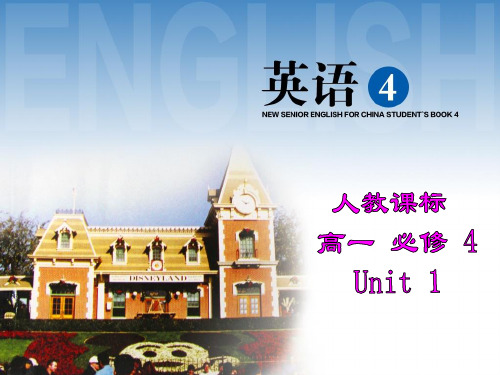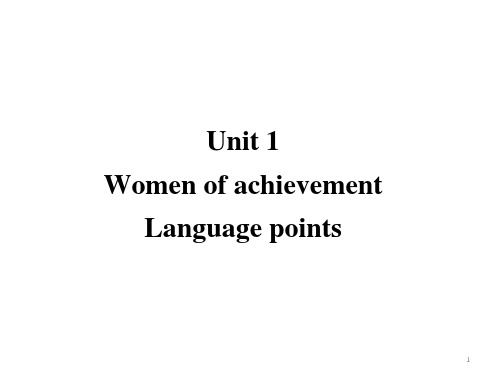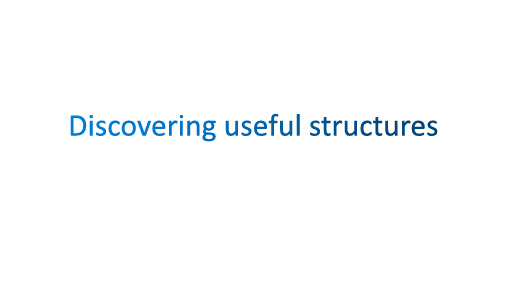【人教版】必修四:Unit 1 Period 2 Language Study 讲义(含答案)
- 格式:doc
- 大小:542.50 KB
- 文档页数:6


人教高中英语必修4全册教案Unit 1 Teaching PlanI. Analysis of the Teaching MaterialThe teaching material of this unit is taken from Unit 1 of the People's Education Press High School English Book 4. Theunit mainly elaborates on environmental protection. The text is based on a speech given by the United Nations Secretary-General at the World Environment Day. The content involves environmental protection, global warming, endangered species, nature reserves, and so on. Through this unit, students can understand the importance of environmental protection and realize the urgency of protecting the earth.II. Teaching Objectives1. Knowledge and skillsa. Master the new words and phrases in the text.b. Understand the main idea and details of the speech.c. Grasp the grammar knowledge related to tense, conjunctions, and prepositions.2. Process and methodsa. Encourage students to think independently and actively participate in classroom activities.b. Cultivate students' reading skills, such as skimming and scanning.c. Foster students' ability to use English to express their opinions on environmental protection.3. Emotion, attitude, and valuesa. Cultivate students' awareness of environmental protection and the sense of responsibility to protect the earth.b. Promote students' positive attitudes towards learning English and enhance their confidence in using English.III. Key and Difficult Points1. Key pointsa. Master the new words and phrases in the text.b. Understand the main idea and details of the speech.c. Grasp the grammar knowledge related to tense, conjunctions, and prepositions.2. Difficult pointsa. How to use English to express opinions on environmental protection.b. How to analyze and understand the text more deeply.IV. Teaching Methods1. Task-based teaching method: Set up tasks or activities related to environmental protection in order to stimulate students' interest and participation.V. Teaching ProceduresStep 1: Pre-reading1. Present the topic "Environmental Protection" and ask students about their opinions on environmental issues.2. Show pictures or videos related to environmental problems and ask students to discuss in pairs or groups.Step 2: Reading1. Skim the text to get the general idea and ask students to summarize the main points.2. Read the text again and underline the new words and phrases.3. Go through the text paragraph by paragraph and explain the key points and difficult words.4. Discuss the questions provided in the textbook and ask students to answer them individually or in pairs.Step 3: Vocabulary1. Help students understand the new words and phrases by giving explanations, synonyms, or antonyms.2. Provide examples and encourage students to use the words in sentences.Step 4: Grammar1. Introduce the grammar points related to the text, such as different tenses, conjunctions, and prepositions.2. Explain the rules and give examples to help students understand and apply the grammar rules.Step 5: Discussion and Group Activities1. Divide the class into groups and assign different topics related to environmental protection.2. Encourage students to discuss and share their ideas and suggestions for solving environmental problems.3. Ask each group to present their ideas to the class and have a group discussion.Step 6: Post-reading1. Ask students to summarize the main ideas of the text and share their thoughts on environmental protection.2. Assign homework to consolidate what has been learned, such as writing a short article or making a poster about environmental protection.VI. Blackboard Design- Unit 1: Environmental Protection- New Words: global warming, endangered, extinct, protection, pollution, destruction, environment, reserve, natural resources - Key Points: Understand the main idea and details of the speech- Difficult Points: How to use English to express opinionson environmental protection- Grammar: Tenses, conjunctions, and prepositionsVII. Teaching ReflectionThis teaching plan is designed to guide the teaching of Unit 1, "Environmental Protection." It focuses on cultivatingstudents' awareness of environmental protection and enhancing their understanding of the importance of protecting the earth. Through various activities and discussions, students canactively participate in the learning process and improve their English skills. However, it is necessary to adjust the teaching plan according to the actual teaching situation and students' abilities.。


英语高一(下)人教版新课标必修(4)Unit 1:同步教案(9)(精品)Period 9 writing一.教材分析:In this period ,the teaching activities will focus on writing. These activities offer students the opportunity to discuss what qualities should a great person have , to imagine if you are required to make a short description about someone .then to write a passage to introduce a famous person.二.学情分析:Our students have difficulties in writing, the teacher should teach them make some sentences first. And then ask the Ss to practice how to write an article.三.教学重点:Develop students ' speaking and writing abilitiesLet students learn how to make description.四.教学难点:Let students discuss how to introduce a famous person.How to develop students' writing ability五:三维目标:知识目标Get students to learn more about a balanced diet and healthy eating.Let students know how to give suggestions and advice能力目标Train students' speaking ability by discussing.Develop students' writing ability by learning to write a description情感目标Enrich students' knowledge of famous person.Train students' writing ability to cooperate with others.六.教学过程(Teaching procedure)Step 1 revision(1.)Check the homework exercises(2.)Ask the students to tell who is the heroine in their heart.II. speaking怎样写人物简介(一)人物简介的写作步骤;概况)age, sex, birth-place, background外貌)appearance ,character教育)education生平)big events in one’s life ( in order of time )评价)evaluation(二) 语法,句法高分tipsA. 概况(尽量用同位语结构,使文章简洁,通顺) 如;1) Born in Poland on Nov. 7 ,1867, Madam Curie is a great scientist.2) Abraham Lincoln, the son of a poor family, was born in Kentucky on February12th, 1809.3) Born of a poor clerk's family, Charles Dickens, a great novelist, had littleschooling.4) Sun Showier, a world champion in diving, is a boy of 14 from Guangdong. B.外貌,性格(巧用with做定语) 如;1) He is near-sighted /far-sighted guy with a pair of glasses on his nose.2) She is good-looking /ordinary-looking/funny-looking with long beautiful hair.3) He is a tall and thin guy with thick eyebrows, looking very handsome.4) Born in Germany, Einstein is a great scientist with an extraordinaryimagination.1)Majored in Science, he graduated from a famous University in the north and after 4 years, he went abroad for further studies.2)Graduated from the department of English of Zhongshan University, she went on further education and received a doctor's degree.D.生平(尽量用复合句倒装,非限定定语从句等,润色文章)如;1)Not only is he interested in science, but also he has a gift for music.2)He set a new world record of swimming, which won a gold medal for China Team.3)So hard does he work that he devotes almost all his lifetime to our human cause.4)With great determination and perseverance, he took 37 years to finish the book, which makes a great contribution to China.E.评估(注意运用一些动词,形容词等短语,词组)如;1)Leifeng set us a good example ,so all the people spoke highly of him and all respected him .2)He is one of the greatest novelists in China and will be always remembered as an outstanding man.3)We sing high praise for his brave stories, and his heroic story will spread all ofChina.4)Lishizhen makes great contributions to Medical literature. (三). Summary1. Possible content:1)personal information2)personality and quality3)things she/he has done4)evaluation from other people2). Possible ways to write the article:Part 1: an introduction of the personPart 2: supporting details1) characters2) achievementsPart 3: a conclusion1) what you think of him/her2) how people view him or her有用句型:……was/ were born in …on…his/her family was so poor that…his/ her father was very strict with him…when he was a small boy/ youngduring his/ her childhoodlive a happy/ hard lifegraduate from…department of …universitywhen at college, he majored in…devote his lifetime/himself to…concentrate himself to…make up one’s mind to do sth.make rapid progress in …set a new world record of …equal the world recordwin (won) a gold /silver/ bronze medalbe selected to/ become a member of…go through hardshipovercome many difficultiesone of the best/ most important …set a good example for…a model teacher/workerbe respected by everyonespeak/ think highly of…be honored as (an excellent athlete)His hard work brought him great success.make great contributions to…III. writing task根据下列提示,写一篇介绍我国著名的水稻专家袁隆平的文章。


Period 2 Language Study1.掌握本课时出现的不带△的新单词和短语在本单元中的用法。
2.理解并能够自主运用重要语言点,如behave, worthwhile, observe, argue, move off, crowd in 等的用法。
1.通过对教材课文的阅读,在课文的具体情境中推断词义、词性,了解重要词汇的基本用法。
2.通过导学案的套用,以练促学,巩固内化重要的语言点,学以致用。
品句填空1.The agreement strengthened the (联系) between the two countries.2.A bird lays eggs in the (巢) it has built.3.Their (举止) towards me shows that they do not like me.4.She had a happy (童年).5.Television provides knowledge as well as (娱乐).6.She is so o that she has hurt the feelings of all her friends.7.There are no trees or bushes to give s in this area, so it is very hot here. 8.He b badly to the customers.9.The scientist has o the stars all his life.10.They are a with their classmates about the solution to the problem.【答案】1.bond(s) 2.nest 3.behavior 4.childhood 5.entertainment 6.outspoken 7.shade8.behaved9.observed 10.arguing1.behave阅读下列句子,注意behave的意思及用法。
Behave yourself; don t make a fool of yourself.注意你的举止,不要闹出笑话。
The child behaved badly at the party.那个孩子在聚会上很没有规矩。
通过观察以上句子,我们发现behave用作(1) 词,意为“(2)”。
【答案】(1)动(2)行为;举止behave well / badly (举止或行为)表现良好/差Behave yourself!放规矩点!单项填空—I am really hungry, Dad.Can I try some of the dishes first?—, Tom.We can only start the meal when everybody is here.A.You canB.Behave yourselfC.Go aheadD.Do it yourself【答案与解析】B 句意:“爸爸,我真的很饿。
我能不能先吃一些菜?”“注意规矩,汤姆,大家都来了才能开饭。
”behave yourself 在此表示“注意规矩”。
2.worthwhile阅读下列句子,注意worthwhile的意思及用法。
Teaching is a very worthwhile career.教书是很值得干的职业。
In my opinion, selling the car at this price is not worthwhile.在我看来,这辆车卖这个价钱不合算。
It is worthwhile to spend / spending two hours reading the book.花两个小时读这本书是值得的。
通过观察以上句子,我们发现worthwhile是(1) 词,意为“(2)”,通常作表语或定语。
worthwhile也可以写成worth while。
另外在worthwhile后面既可接(3) ,也可接(4) 。
【答案】(1)形容(2)值得的(3)动词不定式(4)动词-ing形式worthwhile, worth和worthy的用法区别:worthwhile可以写成worth while,常构成It is worthwhile doing / to do...句型。
worth只作表语,表示“价值……”或“值得……”,其后通常接钱数或动词-ing形式的主动形式。
worthy表示“值得;配得上”时只作表语,后接of加名词或动词-ing形式的被动式,也可以在worthy的后面直接接动词不定式的被动式,表示“可敬的;相称的”时,作定语用。
单项填空It is said that this kind of music worth .A.to listenB.to listen toC.listeningD.listening to【答案与解析】D 句意:据说这种音乐值得去听一下。
worth后接动词-ing形式,如果该动词是不及物动词,则要加上适当的介词或副词。
3.observe阅读下列句子,注意observe的意思及用法。
The patients were observed over a period of several months. 这些病人被观察了数月之久。
I observed him go into the office.我注意到他进了办公室。
We must observe the traffic rules.我们必须遵守交通规则。
通过观察以上句子,我们发现observe作及物动词,意为“”。
其后可以接省略to的动词不定式,动词-ing形式等作宾语补足语。
【答案】观察;注意到;遵守keep sb under observation监视某人;观察某人escape observation没被察觉;不为人所注意observe a rule遵守规则observe, watch, see和notice的用法区别:observe 相当于watch carefully,指从不同的角度长时间地看并研究,尤其用于实验或研究等场合。
watch“看;观看”,特别留意、感兴趣地看运动的东西。
see 指“看到;看见”,强调看的结果,有意或无意地看到。
notice 指“看到;注意到;觉察到”,偶尔看到细小的但可能是重要的东西。
单项填空Though having lived abroad for years, many Chinese still the traditional custom.A.performB.possessC.observeD.support【答案与解析】C 句意: 虽然在国外生活了许多年,许多中国人仍然遵循传统的风俗习惯。
observe在此意为“遵守(规则、法律、习惯等)”。
4.argue阅读下列句子,注意argue的意思及用法。
They are always arguing with each other about money.他们经常为钱而争论。
When I passed, they were arguing heatedly in the room.我路过时,他们在房间里激烈地争论。
Columbus argued that the world was round.哥伦布认为地球是圆的。
通过观察以上句子,我们发现argue可以作及物或不及物动词,意为“(1)”。
表示“就某事和某人辩论”的短语为(2)argue sb sth。
【答案】(1)讨论;辩论;争论(2)with; about / overargue with sb about / over sth为某事和某人争论argue sb into / out of doing sth劝说某人做/不做某事argue for / against a proposal辩论赞成/反对某项建议argue, debate, quarrel和discuss的用法区别:argue指一方坚持自己的意见、立场和观点,并企图通过争论说服对方。
I argued with her for long, but she refused to agree with me.我和她辩了好久,但她不同意我。
debate多指在正式场合进行辩论或争论,双方各自陈述理由,“交锋”的意味较强。
We have been debating about the issue.我们一直在就这个问题进行辩论。
quarrel指由于不满或愤怒与他人进行激烈争辩,争辩的气氛通常是不愉快、不友好的。
They re always quarrelling over little things.他们总是为小事争吵。
discuss指为了解决问题或弄清对方的观点而交换意见。
Mr Wood refused to discuss the matter.伍德先生拒绝讨论这件事。
单项填空She wanted to buy the orange dress, but we her that the blue one was more suitable.A.debatedB.arguedC.persuadedD.demanded【答案与解析】C 句意:她想买那条橙色的连衣裙,但我们劝她相信蓝色的更合适。
persuade“说服;劝说”。
1.move off阅读下列句子,注意move off的意思及用法。
The cars were lined up, ready to move off.车都排好队,准备出发了。
The signal was given and the procession moved off.信号一发出,队伍就出发。
通过观察以上句子,我们发现move off意为“”。
【答案】离开;出发move along向前移动move on继续前行move over挪开;让位move out搬出去move in 搬进去;乔迁新居单项填空A few minutes later, the whistle sounded and the train began to .A.move onB.keep onC.move offD.keep off【答案与解析】C 句意:几分钟之后,汽笛一响,火车就开动了。
move on“继续前行”;keep on“继续”;move off“开动;出发”;keep off“使……不接近”。
2.crowd in阅读下列句子,注意crowd in的意思及用法。
He thought and thought and finally a good idea crowded in his mind.他想了又想,最后想出了一个好主意。